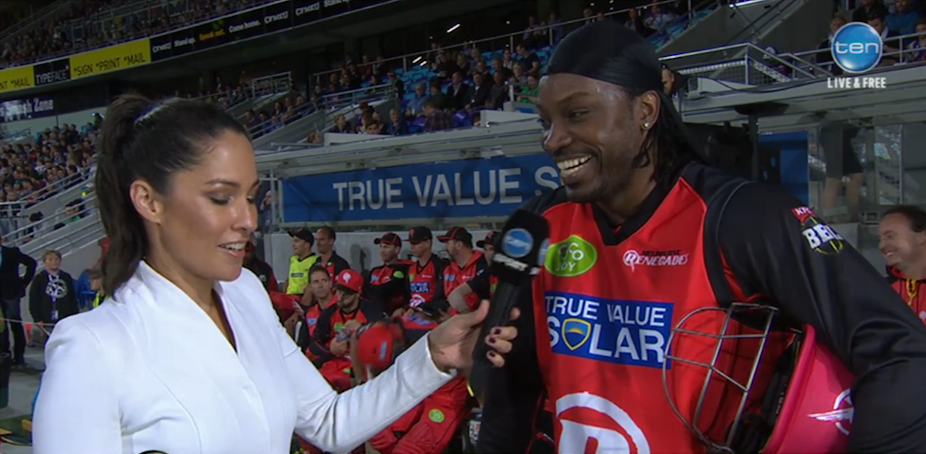If you were hoping to turn to the innocuous TV spectacle of cricket’s Big Bash League for some light relief from the politics of gender, Melbourne Renegades player Chris Gayle just spoiled the party. Instead of spouting a few sporting platitudes in a live interview, he hit on broadcast journalist Mel McLaughlin.
Gayle said:
So hopefully we can win this game and we can have a drink after. Don’t blush, baby.
McLaughlin played it laudably straight and would discuss only the cricket and Gayle’s fitness, but it was an excruciating moment and she was reportedly “embarrassed, angry and upset”.

Broadcaster Network Ten’s commentary team initially handled the incident with their usual forced blokey bonhomie and TEN Sport attached the hashtag #smooth to a tweet about the interview. But then, commentator Mark Howard criticised Gayle and supported McLaughlin. And the approving tweet was deleted.
Network Ten, the Big Bash League and Cricket Australia have all expressed their displeasure at Gayle’s behaviour.
Federal cabinet and the Big Bash League are now caught up in the familiar cyclical dance of condemnations of the sexist conduct while opposed by those who see only everyday banter and harmless flirtation threatened by terminally political correct “social justice warriors”.
Part of the ritual is the perpetrator’s non-apology: not for what was said, but for how it had been taken and its unintended effect. Gayle’s was a textbook example of the genre:
There wasn’t anything at all meant to be disrespectful toward Mel, or offensive.
If she felt this way, then I am really sorry for that. There wasn’t any harm meant. It was a simple joke.
In the space opened between offending statement and offended reaction is the familiar case for the defence – suck it up princess, I was only having a laugh, don’t be so sensitive, can’t we have a joke now? It is a variation of the calls last year for Indigenous AFL player Adam Goodes just to accept being booed every time he took to the field.
It is extraordinary how the perpetrators of offence and their followers are so often sensitive to criticism themselves but blasé about the hurt they do unto others. A particularly unfortunate aspect of the Gayle controversy is that it has happened when some significant progress is being made in improving the position of women in Australian sport.
Only the day before, the Women’s Big Bash League was celebrated as “a ratings hit”. Advances are also being made on other sporting fronts, including women’s cricket in general, and football. However, progress has only been made after protracted negotiations, and in the latter case following a player strike.
But, as Gayle has so amply demonstrated, there is still considerable resistance to the full integration of women into sport culture, and not least in the sports media. At least his behaviour occurred in plain sight, unlike the well-documented cases of female sports journalists being refused entry to male locker rooms or being disrespectfully treated when they did reach the inner sanctum.
One of the best-known examples is that of Lisa Olson. As a sports reporter for the Boston Herald, she sued the New England Patriots gridiron team for sexual harassment in 1991. After reporting the abuse and being continually harassed and threatened in the US as a result, Olson’s then-employer News Corporation transferred her to Australia.
It was only a couple of years later (1993) in Olson’s new home that leading sports journalist Jacquelin Magnay took the Balmain Rugby League Club to the Human Rights and Equal Opportunities Commission to gain access to its locker room.
Although these events happened in the last century, the recent accounts of sports journalists Erin Molan, Julie DiCaro, Caro Meldrum-Hanna, Jessica Yates and Nicole Jeffery indicate that McLaughlin’s experience is by no means an isolated one, and that much worse can happen to women on the sports beat. In some respects, the job has got worse because of the violent misogyny of social media trolls.

It is not only women working in the sports media who get an especially hard time. Chelsea Football Club’s now-ex-manager José Mourinho’s, his club’s and the Football Association’s appalling treatment of team doctor Eva Carneiro led her to leave her position and file legal action against the club and Mourinho for constructive dismissal. Mourinho called her “impulsive and naive” for treating an injured player at a crucial stage of the game.
The cited cases from the UK and US demonstrate that institutionalised gender inequality is not just a problem for Australian sport, although its scale and reactionary resilience in this country is notable.
The point is not simply to list one depressing instance after another, but to create the conditions – starting with increasing women’s participation at all levels of sport – that will prevent the “green shoots” of women in sport being continually trampled by the studded boots of male entitlement.
Last November, Melbourne Cup-winning jockey Michelle Payne famously told everyone, especially the “chauvinistic” horse racing world, to:
… get stuffed, because women can do anything and we can beat the world.
TV protocol did not allow McLaughlin to tell Gayle to “get stuffed”, but many people have now effectively done so on her behalf. The game is changing, baby – get with the program.

